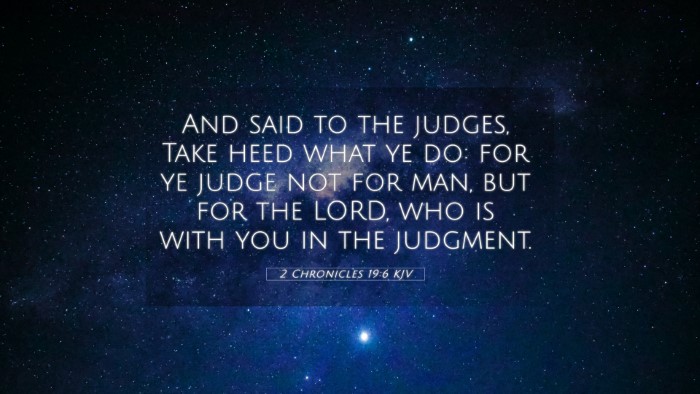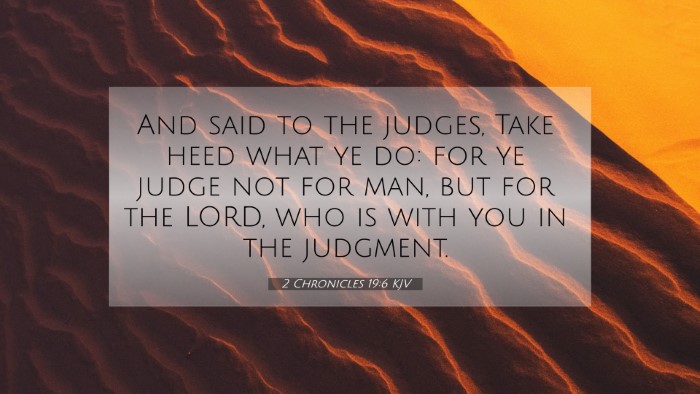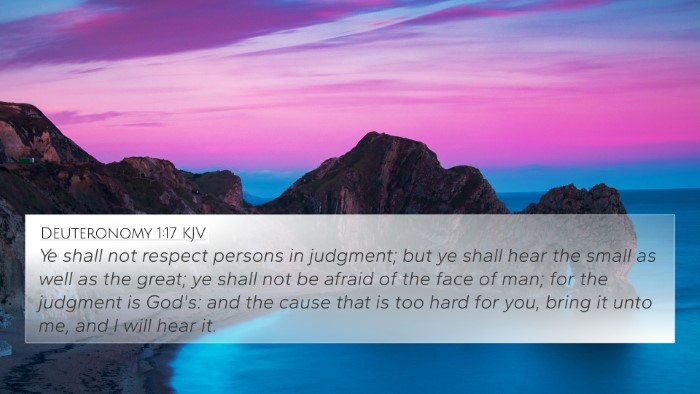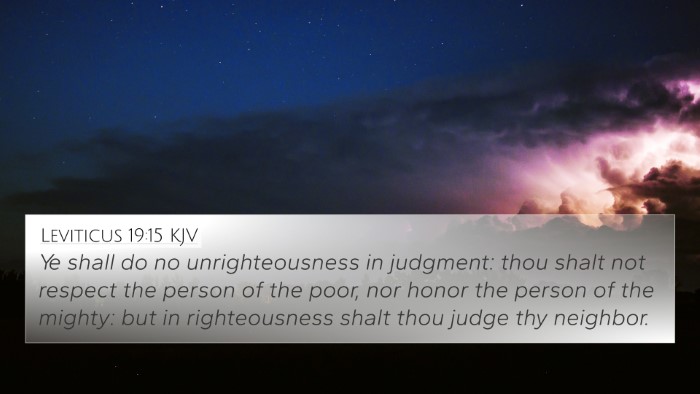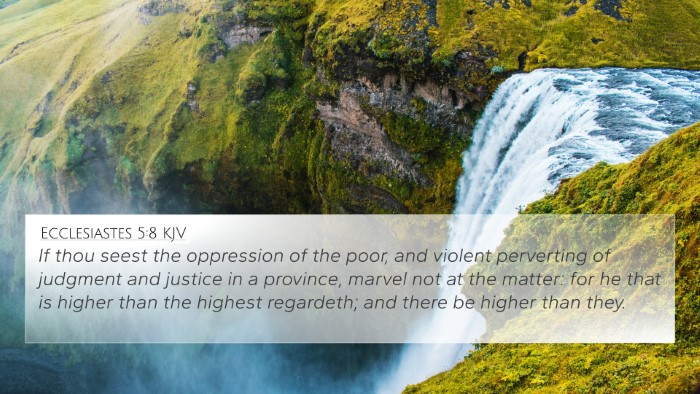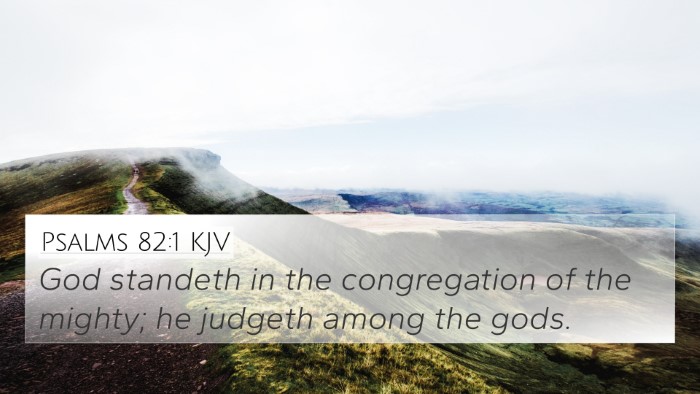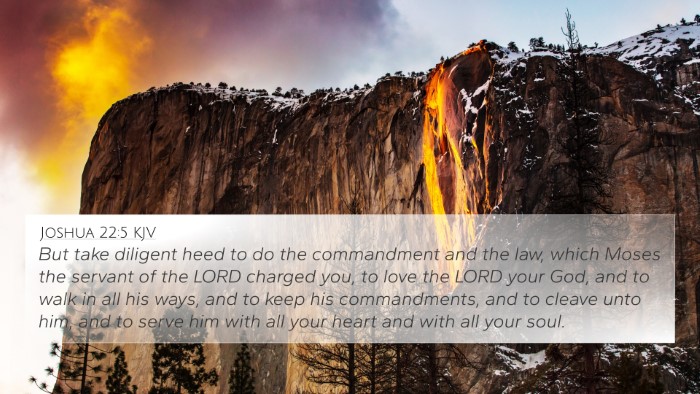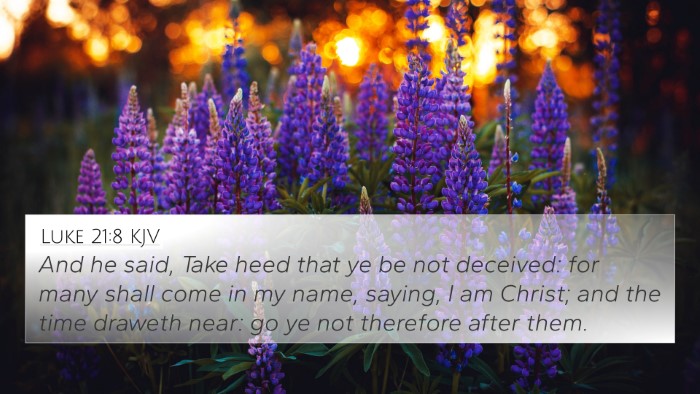Understanding 2 Chronicles 19:6
Verse Text: "And said to the judges, Take heed what you do: for you judge not for man, but for the Lord, who is with you in the judgment." (2 Chronicles 19:6)
Summary of Meaning
This verse emphasizes the critical responsibility judges have in making decisions. They must remember that their authority derives from God and that they are accountable to Him. The call to "take heed" signifies careful and honest judgment, reflecting divine principles rather than human bias.
Commentary Insights
Here, we draw on the insights from various public domain commentaries:
-
Matthew Henry:
Henry highlights the seriousness of the judges' duty, stressing their divine accountability. He notes that they ought to remember that God oversees their judgments and that they are stewards of His justice on earth. This awareness should guide their decisions, encouraging them to act with integrity.
-
Albert Barnes:
Barnes elaborates on the implications of judgment from a divine perspective. He reminds readers that God's presence accompanies the act of judgment, asserting that judges should seek God's wisdom in their rulings instead of relying solely on their understanding.
-
Adam Clarke:
Clarke argues that this admonition serves as a reminder of the moral weight the judges carry. He emphasizes that the judges should not be swayed by human opinions but remain steadfast in seeking God's truth to guide their decisions.
Cross-References
To fully appreciate the themes of accountability and divine wisdom in judgment, the following Bible verses provide relevant cross-references:
- 1 Chronicles 28:9 - A call for sincerity in serving God.
- 2 Samuel 23:3 - The ideal of ruling justly, "he that rules over men must be just."
- Proverbs 21:15 - The joy in executing justice and the distress in wrong judgments.
- Micah 6:8 - God's requirement for justice, mercy, and humility.
- James 3:17 - Wisdom from above, which is pure, peaceable, gentle, and full of mercy.
- Matthew 7:1-2 - A warning against judgment by the measure we use ourselves.
- Luke 12:2-3 - The accountability of our hidden actions being revealed.
Application
This verse speaks not only to judges but also to all believers about the importance of integrity and justice in all aspects of life. As followers of Christ, the principle of reflection in our actions is paramount. Here are some points to consider:
- Reflection: Are your decisions grounded in God's principles?
- Integrity: Do you operate with transparency and honesty in your dealings?
- Responsibility: Recognize that your choices impact others, and seek to align them with God's will.
Thematic Connections
There are various thematic Bible verse connections that align with the principles found in 2 Chronicles 19:6:
- Justice and Accountability: Reflects how we are all called to live justly in light of God.
- Wisdom in Decision Making: Seeks divine guidance in our choices as echoed in Proverbs and James.
- Moral Duty: Recognizing our role in upholding righteousness in every sphere of influence.
Further Study Tools
For deeper understanding, consider using these resources and tools for Bible cross-referencing:
- Bible Concordance – Helpful in identifying similar themes across scriptures.
- Bible Cross-reference Guide – A systematic way to explore related verses.
- Comprehensive Bible Cross-reference Materials – Connecting verses thematically.
Conclusion
2 Chronicles 19:6 stands as a powerful reminder of the sacred duty involved in making judgments and decisions. By anchoring our actions in God's wisdom and reflecting on Scripture, we commit to a life that mirrors the essence of divine justice.

